Counseling Services
Play Therapy
Play therapy is a systematic use of a theoretical model to develop an interpersonal process that is guided by a trained play therapist through the process of play, which functions to help children resolve and prevent future difficulties. Using a child’s primary communication method, play therapy incorporates games, activities, and play to help address and resolve a variety of problems. Play therapy allows children, ages 3-12 years of age, to learn about themselves, and explore relationships and the world around them in a safe and confidential setting with a trained child specialist. While it may look like ordinary playtime, play therapy is more than just that; it allows the therapist to observe and gain insight into the child’s problems based on their expressions through play. Much can be revealed in how a child interacts with different types of toys and their behavior in each session. Through play therapy children can work through issues that may cause distress to them, play out future issues, and express emotions through play. Essentially, play therapy is the equivalent to children as to what counseling is to adults.
How does Play Therapy work?
There is a communication gap between children and adults depending on the age and stage of development of each child, children do not have the same communication skills as that of an adult. “Toys work like a child’s words, and play is the child’s language.”(Landreth, 2002) Through the analysis of the play, trained professionals identify concerns and weaknesses. After rapport and trust are established, a therapist can help to facilitate change. Play therapists help develop a child’s insight, effective communication skills, healthy emotional expression, problem-solving skills, and relational skills. Additionally, therapists work on rational thought processes, and behavior modification, resolve internal and external conflicts and help promote healthy solutions. Children learn to identify and cope with difficult emotions and behavioral issues through this process. Play therapy is used for various mental and emotional health conditions including anxiety, depression, anger management, grief, loss, divorce, trauma, and child abuse. Additionally, play therapy can be used to treat behavioral disorders including, ADHD, spectrum disorders, social skills development, learning disabilities, conduct disorder, and oppositional defiance. Play therapists pay close attention to how a child interacts with different types of toys and depending on these observations the Child's therapy will be tailored to their specific needs. There comes a point where the therapist may include parents, siblings, or other close family members in the session to help teach conflict resolution and to promote healing within the family dynamic.
Play therapy sessions at heritage are typically scheduled in 50-minute increments once a week or as needed. The amount of sessions depends on the child, their response to therapy and the issues treated. Therapists may use techniques such as creative visualization, storytelling, arts and crafts, dolls and action figures, creative movement, legos and construction toys, and board games for the older kids. Depending on the child and situation the therapist will lean towards a certain method of play or allow the child to choose for themselves. Play therapy isn’t just for small children, teens can also have a difficult time expressing their innermost feelings in words.
What are common concerns that can be addressed with Play Therapy?
Play therapy may be helpful in a variety of situations which include:
Facing medical procedures or chronic illnesses
Developmental delay or learning disabilities
School-related behavioral problems
Aggressive or angry behavior
Family issues such as divorce, separation, or death of a loved one
Natural disasters or traumatic events
Domestic violence, abuse, or neglect
Anxiety, depression, grief
Life transitions
Eating and toileting disorders
Attention deficit hyperactivity disorder (ADHD)
Autism spectrum disorder (ASD)
If your child is struggling at home or school, is having a difficult time adjusting to new siblings, is struggling with peers, is frequently angry, sad, or worried, seems out of control, or you are simply not sure how to help your child with their difficulties, play therapy may be the perfect option for your family.
What are the benefits of play therapy?
Play therapy provides a safe space where children can express themselves, try new things, learn about how the world works, and work through their problems. Play therapy provides the tools necessary to help children through healing from past stressful or traumatic events, allowing them to express their emotions in a safe environment, encouraging the child’s creative thoughts and ideas, allowing the development of healthy decision-making skills, and enabling the communication of problems and concerns to others. Play therapy allows children to express their feelings in ways that may not be acceptable in other settings thus allowing the clinician to observe and redirect unwanted behavior in a fashion acceptable in other settings.
Play is a natural part of childhood and is important for the development of children. Trained therapists use play therapy to help children express what is troubling them when they are not able to find the words to express their feelings. A positive and trusting relationship is developed between the therapist and child during play therapy sessions, providing the safe space necessary for emotional healing. Through play, therapists can help children learn more helpful behaviors, understand their emotions, and gain insight into interpersonal conflict resolution for optimal development.
Play therapy is a type of therapy for individuals between the ages of 3 to 13 years old that uses different forms of play in a safe environment to uncover any stress or difficulties. Trained play therapists can gain insight into a child’s inner workings through play via different types of play. With the knowledge gained from observing children, therapists can guide children’s behaviors to a certain goal depending on the child and his/her situation. Heritage offers play therapy in the Dallas and the Plano location, play therapy is in high demand due to our renowned clinicians by word of mouth. To check for availability and scheduling please give us a call at (214) 363- 2345.
Sources:
https://www.healthline.com/health/play-therapy#summary
https://www.dallasctc.com/child-therapy
https://www.dallasintegrativecounseling.com/neurofeedback
FAQ About Play Therapy
At what age can a child or adolescent begin play-therapy?
We are able to work with children in the play therapy room beginning at age three (3). At two (2) years of age this will involve more of a filial counseling with the child in a play therapy setting.
What are some examples of play therapy?
Sessions take place in a safe environment with few limitations, some examples of play therapy include:
Creative visualization
Story telling
Role-playing
Toy phones
Puppets and stuffed animals
Masks and costumes
Arts and crafts
Sand box play
Legos and construction toys
Does play therapy help with ADHD?
Play therapy has been shown to significantly reduce symptoms of ADHD. Studies have been performed from multiple sources to understand the benefits of play therapy on different mental health disorders. In a study performed by Abdollehian E. Et. Al. 2013, the significant differences found between experimental groups and control groups indicate that play therapy can be used to effectively treat children with ADHD.
Related Blogs
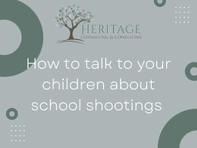
How to Talk to Your Children About School Shootings
According to the Center for Homeland Defense and Security there have been 138 recorded school shooting incidents in 2022 so far**. If you are raising school-aged children you’ve probably encountered...
Published on May 31, 2022
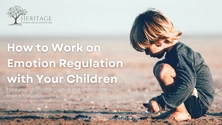
How to Work on Emotion Regulation with Your Children
What is Emotion Regulation? Emotion regulation is the process that allows a child to notice, identify, and manage their emotions. During infancy, babies form attachment bonds with their caregivers based on...
Published on Apr 19, 2023
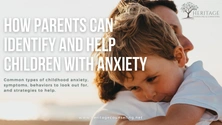
How Parents Can Identify and Help Children with Anxiety
Childhood Anxiety Anxiety is universally defined as an emotion that elicits fear, nervousness, and worry. Anxiety occurs as a mental and physical response to what our brain perceives as a threat. Anxiety...
Published on Jun 21, 2023

Autism Testing: Your questions answered by Dr. Casey Ferri, Psy.D., M.S.
What is Autism Spectrum Disorder? Autism Spectrum Disorder (ASD) is a developmental disorder that is most commonly identified at an early developmental age, or once social demands become more prominent...
Published on Jun 29, 2023
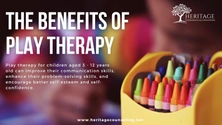
The Benefits of Play Therapy
Introduction For children, playing is an innate activity that fosters emotional expression through imagination, creativity, symbols, and fantasy. Through play, children naturally develop relationships,...
Published on Sep 19, 2023

How to Help Children with Food Anxiety
Food Anxiety in Children Are mealtimes starting to feel like routine meltdowns? Is your child’s picky eating causing daily distress? Do you find yourself engaging in power struggles with your child when it...
Published on Sep 29, 2023

Navigating the Early Years: Challenges for Children Starting School
The start of the school year can be an exciting and challenging time for children and parents alike. Children starting school will experience academic, social, and emotional challenges and growth. While it...
Published on Oct 5, 2023
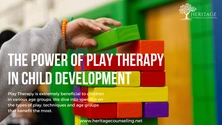
The Power of Play Therapy in Child Development
“Play is the language of children.” This is a common phrase uttered amongst Play Therapy practitioners and proponents, but what does it truly mean? Children do not contain the same level of cognitive,...
Published on Oct 26, 2023
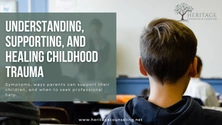
Understanding, Supporting, and Healing Childhood Trauma
“Childhood trauma” is a phrase that can evoke strong feelings, memories, sensations, and thoughts. Despite adults' best efforts, it is not uncommon for children to experience traumatic events during...
Published on Nov 17, 2023
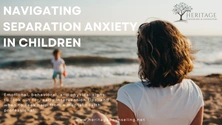
Navigating Separation Anxiety in Children
Separation anxiety is one of the most commonly diagnosed anxiety disorders in childhood. (1) Separation anxiety is a disorder that is classified as a pattern of recurring distress and fear with high...
Published on Jan 12, 2024

How to Set Healthy Limits for Screen Time
In the rapidly advancing digital age, parents grapple with the challenge of managing screen time for their children. As screens become an integral part of daily life, finding a balance is crucial for the...
Published on Mar 14, 2024

Helping Children Cope with Divorce and Blended Families
The stability and health of a child’s nuclear family unit can have a fundamental influence on their emotional well-being. Oftentimes, parents do everything in their power to protect this however, divorce is...
Published on Mar 27, 2024
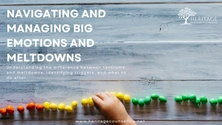
Navigating and Managing Big Emotions and Meltdowns
Emotional regulation during childhood represents a fundamental aspect of healthy development, one that is often pivotal in navigating the challenges of childhood meltdowns. Unlike tantrums that children may...
Published on Apr 10, 2024
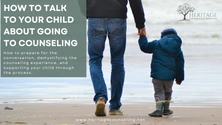
How to Talk to Your Child About Going to Counseling
Introducing the idea of counseling to your child can be a delicate task, but it is an important step in ensuring their mental and emotional well-being. As parents, you want the best for your child, and...
Published on Jul 31, 2024
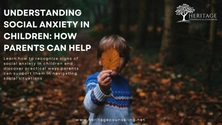
Understanding Social Anxiety in Children: How Parents Can Help
Social anxiety is a common mental health issue that can significantly impact a child’s development. When left unaddressed, it can interfere with their ability to form friendships, succeed in school, and...
Published on Sep 24, 2024
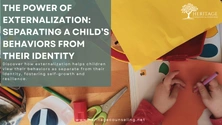
The Power of Externalization: Separating a Child’s Behaviors from Their Identity
When working with children who exhibit challenging behaviors, understanding the process of externalization can be transformative. Externalization, a concept rooted in narrative therapy, involves separating...
Published on Nov 26, 2024

6 Helpful Tips for Creating a Calm and Enjoyable Holiday Season for Children with Anxiety
The holiday season is a time of joy and togetherness, but for children with anxiety, it can also be overwhelming. From disrupted routines to sensory overload, the festive season may amplify stress, leaving...
Published on Dec 19, 2024

Handling Holiday Transitions in Blended Families
The holiday season is often seen as a time for family togetherness, joy, and celebration. For blended families, however, it can also bring a unique set of challenges. Adjusting to new traditions, sharing...
Published on Dec 19, 2024
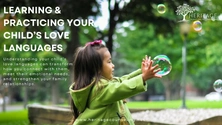
Learning & Practicing Your Child’s Love Languages
As parents, understanding how to connect with your child on a deeper level is essential to fostering a loving and secure relationship. One powerful framework for achieving this is through identifying and...
Published on Jan 31, 2025

Discover Heritage Counseling & Consulting’s Dallas Office
At Heritage Counseling & Consulting’s Dallas location, we are proud to offer exceptional mental health services tailored to the diverse needs of our clients. Conveniently located next to Mockingbird...
Published on Feb 28, 2025

Understanding Temper Tantrums: Why They Happen and How to Respond
Temper tantrums are a common part of childhood development. As young children learn to express their emotions and navigate the world, they often experience frustration, disappointment, or overstimulation,...
Published on Mar 14, 2025

Discover Heritage Counseling & Consulting in Austin, Texas
At Heritage Counseling & Consulting, P.A., our Austin office is dedicated to providing exceptional mental health care tailored to each individual's unique needs. Conveniently located off Highway 360 near...
Published on Apr 3, 2025
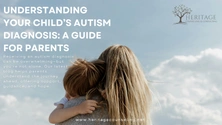
Understanding Your Child’s Autism Diagnosis: A Guide for Parents
Understanding your child's autism diagnosis is an important step in learning how to best support their growth and development. According to the Centers for Disease Control and Prevention (CDC),...
Published on Apr 11, 2025